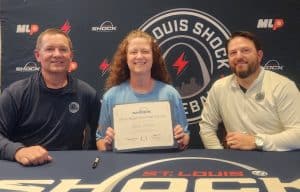Careful crop dusting protects wheat from fungus
Those residing just south of Waterloo or driving in that area Saturday morning may have seen a low-flying aircraft and thought they were being treated to some special type of air show.
In fact, it was an amazing display of flying skill and modern technology to improve wheat yields and quality as a crop dusting plane swooped low over the wheat fields of Delbert Wittenauer off KK Road.
The low-winged, bright yellow monoplane — with the characteristic cockpit projecting angularly above the fuselage — is one of six such aircraft operated by Holzwarth Aerial Application Company near Springfield..
The gas-turbine powered aircraft are equipped with high-tech GPS equipment and, in combination with GIS map data, this allows the pilot to precisely find and dust a specific field quickly and safely.
“Wheat has to be sprayed at exactly the right time and under the right conditions,” Wittenauer explained. “The wheat has to be blossoming for it to work.”
Wittenauer said the graminearum fungus is always present in soil. But when wheat is blossoming, this fungus can infect the wheat head. The head will lose test weight and be less valuable, have its quality reduced, and contamination can even render it unusable for human consumption.
This crop dusting plane applies chemical spray to Delbert Wittenauer’s wheat field off KK Road south of Waterloo on Saturday.“It has to be dry, and there has to be adequate time after spraying for it to be effective,” Wittenauer said concerning the timing of crop dusting. “Aerial application also requires low to no wind for it to be effective.”
Why does he employ aircraft spraying instead of ground application?
“In smaller fields and fields with lots of corners and resulting turns, using a ground sprayer results in much more damage from vehicle tracks,” Wittenauer said.
He said he uses ground spraying equipment on larger fields in the bottoms.






